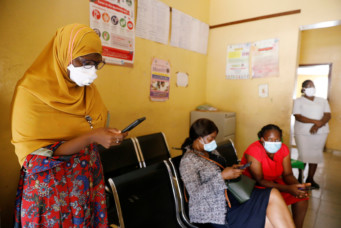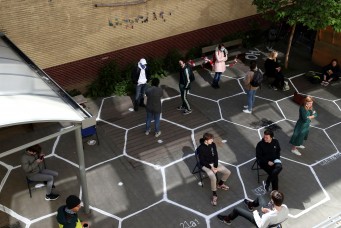COVID-19 and ‘Reinventing’ a New Economic Model

A woman walks past an employment agency “ExtraStaff” in North London, amid the spread of the coronavirus disease (COVID-19), in London, Britain June 16, 2020. June 16, 2020. John Sibley/Reuters
What is happening to the world? A question we all ask ourselves and the answer we all get is, “everything is changing”. The world is a dynamic place that is gradually, yet constantly changing, and COVID-19 serves as a catalyst that is expediting this change process. We can see and feel this change on our faces with everyone wearing protective masks or having our temperature measured before entering a building. Most importantly, we are practicing physical distancing, while desperately trying to stay socially connected. All these changes highlight the beginning of a new era that presents different challenges than the ones we faced before.
The economic system in the post-COVID-19 world is unfortunately characterized by the following challenges: a pandemic, climate crisis, social unrest due to high levels of income inequality, gender and race inequalities, and the need for a new and more equitable social contract. The system is also characterized by hundreds of millions losing their jobs, millions of businesses going bankrupt, and jeopardy of the future of work as the fourth industrial revolution is around the corner.
What all these problems have in common is that they push people to think and ask a question; are we trapped within a broken economic model? Yes, COVID-19 has fundamentally shaken our economic systems, and they seem to be failing at meeting the needs of the people in the post COVID-19 world.
Yes, the world has changed and at a rate much faster than we ever expected. COVID-19 showed us the flaws of our system and has also shown us how our survival instinct made us try so hard to be agile and adapt to change. COVID-19 presents a closing historical window of opportunity to reshape the system; humans have to seize this opportunity to be on a more sustainable path and we need to start thinking of developing and implementing a new economic model that meets all humans’ basic needs and maximizes human wellbeing.
Current global economic recovery efforts cannot rely on previously developed methods, techniques and programs to effectively fight this unprecedented crisis. To this day, there is no specific treatment for COVID-19, and the medications currently used are previously developed anti-viral drugs that do not kill the virus, but rather work on limiting its spread in the body. Just like how we need a new treatment for COVID-19, we also need a new economic model to successfully overcome this crisis and helps economies to thrive, not just survive.
People prefer stories over numbers as they can be easily understood and remembered. As such, for this new model to be successful it has to have a story that describes the present and depicts the future. This story has to be simple and should address all the above-mentioned problems to be widely supported by the masses. If people want to replace an existing story, we need to come up with a better one; to agree on a new narrative on how we want to live.
This is what happened when Laissez Faire economics failed, it was replaced by Keynesian economics that offered a different narrative that was widely accepted—a narrative that revolved around redistributing wealth and spending public money on public goods. When Keynesian economics failed, it was replaced by Neo-liberalism that was also widely accepted by the masses at the time: it was characterized by taking the state out of the equation and that the private sector will create wealth and opportunity for the masses.
In the 2008 financial crisis, when Neoliberalism failed, it did not die and was not replaced by another economic model. Yet, it still dominates our lives to this day, which raises a simple question, why does it still exist? The simple answer is because there is no consensus on the alternate story of how we want to live in the post-Neoliberal world. In 2020, Neoliberalism was put to another test where it failed again with hundreds of millions being left behind. Consequently, now is the time to work on an alternate story, a new economic model that solves the current problems and is supported by the masses.
The story of our new economic model has to be characterized by forward-oriented solutions that have a broader impact in a much shorter period of time. We need an economic transition similar to the one that happened from Keynesian to Neoliberalism; now is the time for the shift from Neoliberalism to the new economic model.
As a result, this models needs to be fairer, and through equitable sustainable development, sharing of wealth and universal basic income, it prevents anyone being left behind We need a new model that utilizes the diverse capacities of 7.8 billion individuals to fight climate crisis and inequality. Humans need a new model that encompasses circular economy and new techniques in building more inclusive, equitable and sustainable cities that live on planetary means, where food security is not an issue, and technological developments are seen as opportunities not threats.
Most importantly, we need new models of trade and making business as the current models proved that the supply chain is as weak as its weakest link. We need a new model that makes the world a better and more connected place for us now and for future generations. All this drastic change has to come in the coming 10 years, before it is too late.
The only way forward is to start a global conversation as soon as possible, where people lay down the foundations of this new model, and once we reach a consensus, we need to start implementing it. Maybe we will not get to immediately see the positive impacts of this model when it successfully works, but for sure our future generations will thank us for our efforts.
Dr. Ahmed Alaa Fayed is an Egyptian academic, educator and a social entrepreneur. Fayed is currently the Executive Director of the Modern Schools of Egypt (MSE) group. He is also the Founder & CEO of Cairo Graduate College (CGC). Previously Fayed was an Assistant Professor of Public Policy. He earned his PhD in Public Policy from King’s College London – University of London and his MPA & BSc from the American University in Cairo.
Read MoreSubscribe to Our Newsletter





